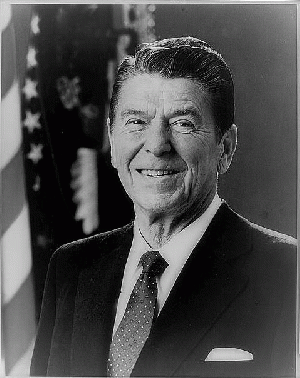January 20 marked 25 years since Ronald Reagan left the Presidency. And February 6 marked the 103rd birthday of the former sports announcer, actor, governor of California, and 40th president of the United States of America. Reagan's economic legacy is one of failure, but in another way it could be argued that he was genuinely transformative: as the first celebrity politician for the modern corporate state.
Every president is ultimately judged on great ideas, visions, and responses to historical forces. Some of the forces which shaped the Reagan presidency could be seen with the unaided eye, like the fall of Communism (a long-developing trend which came to a head during the Reagan Administration). Others were less visible but nevertheless shaped his Presidency.
It's ironic, given his professional history, but Reagan may have been less of an "actor" in the historical sense than any president of modern times. He was acted upon, by economic interests and social forces toward whom he demonstrated neither the ability to understand nor the willingness to learn.
That's not to say he was without gifts. Ronald Reagan was intelligent and articulate. (His posthumously published letters should end any doubts on that score.) He was an extraordinary communicator. And he was, at least in his public persona, eminently likable.
In other words, he was a great salesman. And Reagan, who would have been described in modern parlance as a "B-list celebrity," had the good fortune to demonstrate some A-game sales skill just as the modern American corporation was coming into being.
As host of the "GE Theater" in the 1950s, Reagan was the public face of a rapidly expanding manufacturing company. GE would soon become a multinational corporation, poised to benefit from the pro-business trade policies Reagan and his successors were to pursue. Like some sort of corporate shapeshifter, GE even formally became a bank -- just in time to benefit from the Wall Street bailouts.
Reagan, who would mock "special interests" in his first inaugural speech, then became a spokesperson for one of the most powerful of them -- doctors. He deployed scare tactics, hard-right imagery and merciless Red-baiting in a failed attempt to defeat Medicare. That program, along with Social Security, is one of the most successful and popular government programs in American history.
Then came Reagan's nomination speech for Barry Goldwater. Goldwater, like many conservatives of his time, had a grim and joyless affect. But the assembled business leaders and political bosses saw that Reagan was, at least outwardly, a new kind of conservative: sunny, funny, and light on his feet.
Ronald Reagan was a closer.
And yet, for all the lightness of his bearing, Ronald Reagan could sound as extremist as today's most irrational gun-toting Tea Partier. In his Goldwater nomination speech, for example, Reagan said that "The Founding Fathers knew a government can't control the economy without controlling people ... when a government sets out to do that, it must use force and coercion to achieve its purpose. So we have come to a time for choosing."
With rhetoric like that, is it any wonder that 44 percent of today's Republicans believe that "in the next few years, an armed revolution might be necessary in order to protect our liberties"? This brand of far-right extremism believes that government itself -- democratically elected, fully representative government -- is fundamentally unjust unless that government serves the far right, and only the far right.
This ugly remnant of the Reagan legacy constitutes a grave threat to peaceful democratic process.
The avuncular Reagan could also be consummately, shockingly mean-spirited, as when he said in endorsing Goldwater: "We were told four years ago that 17 million people went to bed hungry each night. Well that was probably true. They were all on a diet."
Mean-spirited, and not very funny.
Reagan used the same speech to argue for the privatization of Social Security. Put it all together and you have the record of a man who: changed his opinions to those of his well-paying sponsors, however sincere that change may have been; stood in opposition to two highly popular and successful government programs; mocked the hungry and poor; repeatedly Red-baited his opponents (he routinely warned of "a thousand years of darkness" if his opponents prevailed); and fueled a growing movement of rage-filled anti-government extremism.
All this, and we're only up to 1964.
(Note: You can view every article as one long page if you sign up as an Advocate Member, or higher).






